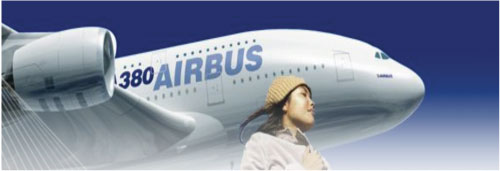GOLD WINNER: Airbus

Client: Airbus
Entrant Company: PHD London
Entry Category: A Global Campaign or multinational campaign running in more than one region
Names to be credited with submission:
Natalie Morris-Girlanda, PHD
Simon Robinson, PHD
Adam Bilton, PHD
Time Period of Campaign: 2008
Case Study Summary:
Marketing Situation: Airbus is a globally-renowned aircraft manufacturer with a solid reputation. In 2007, however, the company faced numerous challenges, including delays with the A380 launch (new super jumbo). The fall of the US dollar also had a detrimental affect on Airbus’s financials-- leading to a budget re-structuring program resulting in a 50% decrease in media spend. Airbus was being outspent 4:1 by their nearest competitor.
As a result of these issues, Airbus’ credibility and brand confidence fell, as did aircraft orders. The goal was to re-build brand credibility and establish Airbus’s eco-credentials through the A380.
Key Insights: Although Airbus was still a leading global innovator, the company had become apprehensive in its communications due to the current challenges. To put Airbus back in the driver’s seat, a new global communications approach needed to be developed for the brand, using the A380 as the platform.
The campaign’s ultimate success was based upon an understanding of new audience insights, industry insights, communication insights and competitive media insights—all of which contributed to a strategy to differentiate the Airbus brand.
In the audience sector, it was determined that there were three very different target groups based upon their role in the aircraft purchasing chain. Key industry insights pointed to interest in developing more fuel-efficient and eco-friendly aircraft as air travel is expected to double by 2020. The communications insights resulted from a survey on media consumption patterns among key audiences; it was determined that digital was the preferred media for accessing business and aviation information, while PR, conferences and sales relations were also influential. Airbus’ nearest competitor spent only a small percent of its budget on digital media.
Media Strategy:The media strategy was based on instilling a thought leader with “Confidence”-- by focusing on Airbus’s success stories, putting challenges aside, and re-establishing the brand’s stature by leading communications behavior. To achieve this with a limited global budget, four key principles were employed:
1. Be Focused: Cherry-pick leading global business and trade media with relevant environment content to leverage Airbus’s eco-credentials. Also focus on contextual search advertising to minimize waste.
.
2. Be Impactful—“own” digitial media on an exclusive basis and use high-impact print formats. To showcase brand confidence in digital, there was an emphasis on roadblocks and home page take-overs. While in print, gatefolds, inserts, cover wraps, fireplaces and other prime positioning was used.
3. Be Intriguing—use Airshow sponsorships to deliver content and create interest through bespoke video and mobile to drive traffic to Airbus.com.
4. Be Integrated-- Coordinate and leverage all Airbus communications to include PR, conferences, and Airshow activity during key Shows (Farnborough, Paris, Dubai).
How Could this be a Template for Other Campaigns or for World Class Standards?
Limited budget do drive innovative thinking. The A380 launch campaign is an example of how a brand’s credibility can be re-built in the worst of times by applying the right communications approach—even with a very restricted budget. At the heart of the initiative is: utilize a simple and clear strategy, focus on developing innovative ideas that speak to audiences in a more targeted and engaging way, help change perceptions by showcasing the brand as an environment leader within its business sector.
Results: The results exceeded the client’s expectations. Online ad awareness and familiarity with the A380 were rated as “Excellent” against industry benchmarks. Using an online advertising effectiveness study with a sample of 1,383 business executives, results showed that respondents were twice-as-likely to consider Airbus the category leader on environmental issues than any other company. Airbus also showed an advantage over other category leaders in perceptions of being innovative and anticipatory of market trends. |

